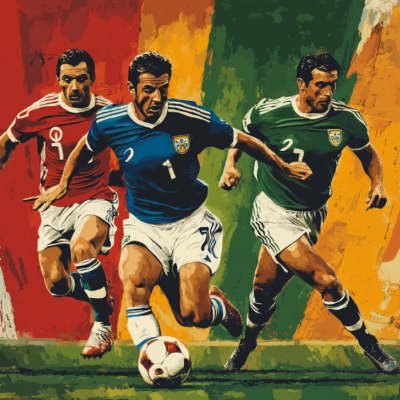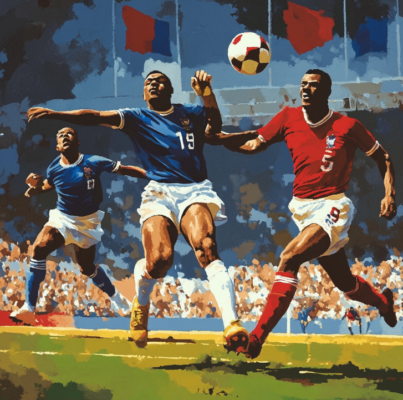A lot of interesting events took place at the football Olympic tournament, which was very tough. Only the best of the best win. Not all national teams managed to get to the medals.
By the way, you can bet during the current Olympics through any online casino aus. Australian Igors not clubs offer bonuses for sports betting, that increase your chances of winning.
Italy: 1 gold, 2 bronze
The Italian team, four-time world champions and two-time European champions, has not been as successful at the Olympics. They won their only gold in 1936 at the Berlin Games, when football was reintroduced to the Olympic programme. Although the Italians, who were the reigning world champions in 1934, sent a “youth” squad to Berlin, many players were already playing for leading clubs. Two years later, Locatelli, Rava, and Foni became world champions with the main team. In the final, Italy defeated the Austrians 2-1 in overtime.

The Italians won bronze medals in 1928 in Amsterdam and at the Athens Olympics in 2004. In Athens, the key players of the team were Gilardino and De Rossi. Gilardino played a decisive role, levelling the score in a tense match against Ghana (2-2) with seven minutes to go and scoring two goals in the game against Japan (3-2). He also scored the winning goal in the third-place match against Iraq.
France: 1 gold, 1 silver
The gold medal for France in 1984 was the beginning of its triumphs on the international stage. First, the team won the European Championship and then won first place at the Olympic Games in Los Angeles, where they beat Brazil 2-0 in the final under coach Henri Michel.
France won silver medals at the 1900 Olympics, when football first entered the Olympic programme. Interestingly, teams then represented their countries in a club format. Only three clubs participated in the tournament, playing each other two games each. The French club Union France de Sports Athletique managed to defeat the Brussels University team, but lost to the British Upton Park, eventually finishing in second place.

Czechoslovakia: 1 gold, 1 silver
Czechoslovakia celebrated its triumph at the 1980 Moscow Olympics. The team placed first in their group, which included Kuwait, Nigeria, and Colombia. In the quarterfinals, the Czechoslovaks confidently defeated Cuba 3-0. In the semifinals, they defeated Yugoslavia (2:9), and in the final, they met with the players of the GDR, who had earlier defeated the main favourite of the tournament, the USSR national team. Czechoslovakia won the final with a minimum score of 1:0; the only goal was scored by Jindřík Svoboda, who became a symbol of victory for the team from Czechoslovakia.
The first experience of participation in the final was unsuccessful: at the 1964 Olympic Games in Tokyo, Czechoslovakia lost the gold to the Hungarians (1:2).
Nigeria: 1 gold, 1 silver, 1 bronze
Nigeria became the first African country to win an Olympic gold medal in football. This happened at the 1996 Atlanta Games. The famous 1996 national team consisted mainly of players who played in the top European leagues. Nwankwo Kanu (Ajax), Victor Ikpeba (Monaco), Taribo West (Auxerre), Daniel Amokachi (Everton), JJ Okocha (Eintracht), and their mates created a real sensation by beating Mexico in the quarter-finals and in the semi-finals in overtime, defeating Brazil itself with Roberto Carlos, Bebeto, and Ronaldo. In the final, Nigeria defeated Argentina with Ayala, Simeone, Crespo, Ortega, and Sanetti.
In 2008, Nigeria reached the final again, facing Argentina, but this time the South American players were stronger. In Rio de Janeiro in 2016, Nigeria won bronze medals.
Poland: 1 gold, 2 silvers
The Polish national team, which met Spain in the final of the 1992 Olympic Games, is joint 9th-10th in the ranking of the most decorated teams at the Olympics. In addition to the silver medal from Barcelona (1992), the Polish team also won silver from Montreal (1976) and a gold medal at the Munich Games in 1972. In that tournament, the teams first went through two group stages: after winning their group with a clear advantage, the Poles advanced to the final group, where their opponents were the USSR, Denmark, and Morocco. Victories over the USSR and Morocco, as well as a draw with Denmark, allowed Poland to top the group and reach the final, where they defeated Hungary 2-1.
Germany: 1 gold, 2 silvers, 3 bronzes
The footballers of the GDR made a significant contribution to the piggy bank of the United Germany by winning three medals at the Olympic Games in the 1970s: a bronze medal in Munich 1972, a gold medal in Montreal 1976, and a silver medal in Moscow 1980. The West German team failed to achieve the same success at the Olympics, winning bronze in Tokyo (1964) and Seoul (1988). In addition, the German team won a silver medal at the Rio Games in 2016.









